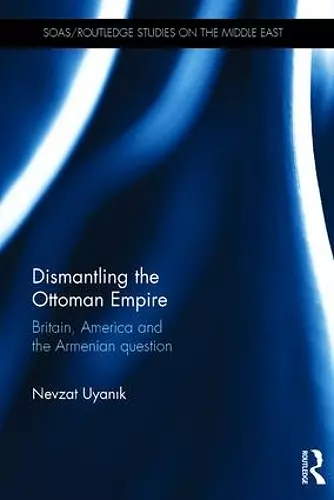Dismantling the Ottoman Empire
Britain, America and the Armenian question
Format:Hardback
Publisher:Taylor & Francis Ltd
Published:25th Sep '15
Currently unavailable, and unfortunately no date known when it will be back
This hardback is available in another edition too:
- Paperback£49.99was £49.99(9781138099715)

Prior to World War I, American involvement in Armenian affairs was limited to missionary and educational interests. This was contrary to Britain, which had played a key role in the diplomatic arena since the Treaty of Berlin in 1878, when the Armenian question had become a subject of great power diplomacy. However, by the end of the war the dynamics of the international system had undergone drastic change, with America emerging as one of the primary powers politically involved in the Armenian issue.
Dismantling the Ottoman Empire explores this evolution of the United States’ role in the Near East, from politically distant and isolated power to assertive major player. Through careful analysis of the interaction of Anglo-American policies vis-à-vis the Ottoman Armenians, from the Great War through the Lausanne Peace Conference, it examines the change in British and American strategies towards the region in light of the tension between the notions of new diplomacy vs. old diplomacy. The book also highlights the conflict between humanitarianism and geostrategic interests, which was a particularly striking aspect of the Armenian question during the war and post war period. Using material drawn from public and personal archives and collections, it sheds light on the geopolitical dynamics and intricacies of great power politics with their long-lasting effects on the reshuffling of the Middle East.
The book would be of interest to scholars and students of political & diplomatic history, Near Eastern affairs, American and British diplomacy in the beginning of the twentieth century, the history of the Ottoman Empire, the Middle East and the Caucasus.
Uyanik seeks to contextualize the dissolution of the Ottoman Empire by focusing on the interplay between US and British interests regarding the Armenians. The author outlines the changing attitudes of the US government about assuming a mandate over Armenia/Eastern Anatolia. Uyanik argues that the missionary lobby in the US was very influential in setting policy that would be favorable to the "Christian Peoples" of the Ottoman Empire. At the same time, the US kept the Entente at arm’s length about declaring war on the Ottoman Empire, in part to protect missionaries. This provided an interesting perspective on the interplay between the British and the Americans. British realpolitik and US idealism clashed and, at times, agreed over the manner in which to shape the postwar Middle East. Grounded in British and US archival material, including the personal papers of numerous British and US officials, and buttressed by English and Turkish secondary sources, the work is well documented. This thought-provoking argument provides context for the Armenian issue in the post WWI context. Summing up: Highly recommended' J. Tallon, Lewis University, in CHOICE
ISBN: 9781138914025
Dimensions: unknown
Weight: 540g
192 pages